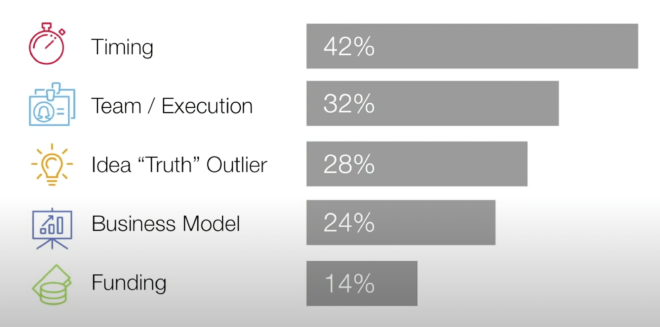Why do so many start-ups fail?
Table of Contents
Start-ups are one of the best ways to make an impact on the world and change it into a better place. Take a group of people with the right skill-set and organize them into a start-up and you can unlock a tremendous amount of innovation and change. But if start-ups have so much potential, why do so many fail?
A lot of people would argue that the number one most import reason behind a start-up’s success is a great idea. One person who also once shared this belief is the founder of Idealab Bill Gross. However, once he and his team studied more than 200 companies’ successes and big failures he arrived to a different conclusion.
Factors in play #
The IdeaLab studied five main factors that they observed accounted the most of the companies’ successes and failures.
- The idea
- The team
- The business model
- The funding
- The timing
These 5 factors were analyzed in detail across 200 companies, 100 of which were idealab companies and the rest were non-idealab companies.
The results #
Idealab tried to rank these 5 factors based on the results from the study they conducted and the results were quite surprising.

The number one thing was timing. Timing accounted for 42 percent of the difference between success and failure. Team and execution came in second and the idea actually came in third. This does not necessarily imply that the idea is not important accross all cases but sometimes the timing of the idea mattered more than its greatness.
Timing as the deciding factor #
Let’s take a look at a few concrete and popular examples. A very popular example is the story of Airbnb. Airbnb was founded in 2008 and it was a time when the economy was in a recession. People were not traveling as much as they used to and the idea of renting out your home to a stranger was not as popular as it is today. The idea was rejected by many smart investors because they believed that nobody is going to rent out their home to a stranger. But one of the reasons why Airbnb was so successful was that it was founded at the right time. The timing was right and the idea was great.
The timing of the recession meant that people were in desperate need of extra cash and that maybe helped people overcome their objection against renting out their home to a stranger.
Another famous example is Uber. Uber was founded in 2009 and it was a time when the economy was still recovering from the recession. People were still in need of extra cash and the idea of renting out your car to a stranger was not as popular as it is today. Although the idea, the execution and the business model were all great, the timing was actually perfect. Many companies have implemented Uber’s idea prior and have failed have failed because wrong timing meant a lack of demand.
The takeaway #
In summary, it is obvious that the execution, the team and the funding definitely matters a lot. A start-up needs all 5 factors in order to achieve a big success but but timing might matter the most. According to Bill Gross, the best way to assess timing is to really look at whether consumers are really ready for what you have to offer them. You need to honestly asses the demand for your product or service and if you think that the demand is not there yet, you might want to wait a little bit longer.
